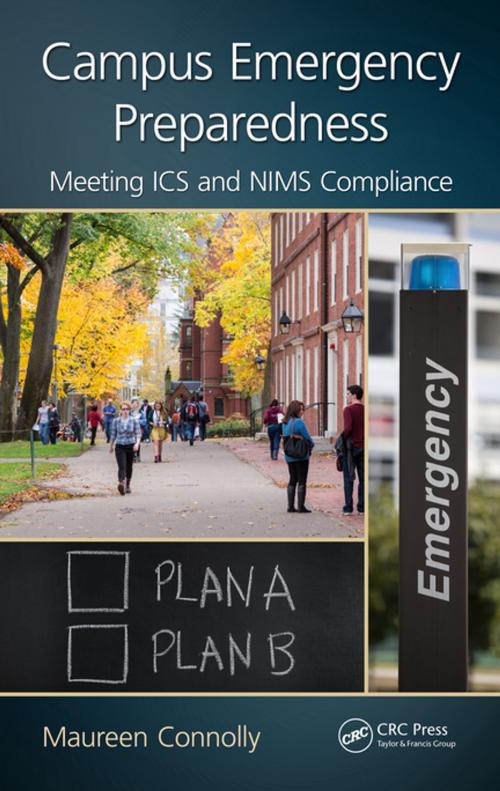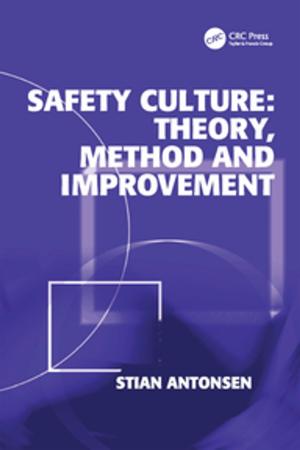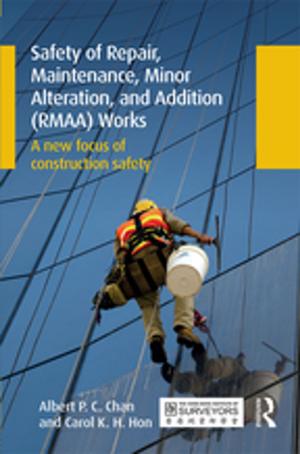Campus Emergency Preparedness
Meeting ICS and NIMS Compliance
Nonfiction, Computers, General Computing, Business & Finance, Management & Leadership, Management, Social & Cultural Studies, Social Science| Author: | Maureen Connolly | ISBN: | 9781498766593 |
| Publisher: | CRC Press | Publication: | December 1, 2015 |
| Imprint: | CRC Press | Language: | English |
| Author: | Maureen Connolly |
| ISBN: | 9781498766593 |
| Publisher: | CRC Press |
| Publication: | December 1, 2015 |
| Imprint: | CRC Press |
| Language: | English |
An easily digestible guide, Campus Emergency Preparedness: Meeting ICS and NIMS Compliance helps you develop and organize emergency operation plans. It incorporates the key components recommended by the Federal Emergency Management Agency (FEMA) and the US Department of Education and outlines the roles and responsibilities of campus personnel before, during, and after an emergency. Events covered include chemical spills, toxic gas releases, terrorist attacks, active shooter events, pandemics, floods, hurricanes, tornados, fires, and other natural or man-made hazards.
The information in this book is extracted from FEMA and US Department of Education documents and training, as well as concepts and strategies from a cross-section of college and university emergency plans. These resources have been melded together to provide you with strategies for protecting, preventing, mitigating, responding, and recovering from threats and hazards that may occur at an institute of higher education.
The book aids you in creating emergency response plans that comply with standards set by the ICS and NIMS. Ultimately, these are all-hazards strategies that can be applied to all phases of campus emergency management with efficient coordination among all levels of campus administration.
Safety in higher education institution campuses is a critical issue today in the wake of several events in recent years. Campus Emergency Preparedness helps you work toward creating a campus environment that is as safe as possible for your students, faculty, and staff. It is a valuable source for anticipating and handling a broad range of emergencies.
An easily digestible guide, Campus Emergency Preparedness: Meeting ICS and NIMS Compliance helps you develop and organize emergency operation plans. It incorporates the key components recommended by the Federal Emergency Management Agency (FEMA) and the US Department of Education and outlines the roles and responsibilities of campus personnel before, during, and after an emergency. Events covered include chemical spills, toxic gas releases, terrorist attacks, active shooter events, pandemics, floods, hurricanes, tornados, fires, and other natural or man-made hazards.
The information in this book is extracted from FEMA and US Department of Education documents and training, as well as concepts and strategies from a cross-section of college and university emergency plans. These resources have been melded together to provide you with strategies for protecting, preventing, mitigating, responding, and recovering from threats and hazards that may occur at an institute of higher education.
The book aids you in creating emergency response plans that comply with standards set by the ICS and NIMS. Ultimately, these are all-hazards strategies that can be applied to all phases of campus emergency management with efficient coordination among all levels of campus administration.
Safety in higher education institution campuses is a critical issue today in the wake of several events in recent years. Campus Emergency Preparedness helps you work toward creating a campus environment that is as safe as possible for your students, faculty, and staff. It is a valuable source for anticipating and handling a broad range of emergencies.















